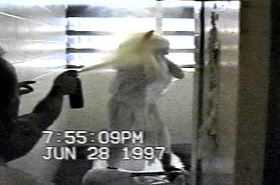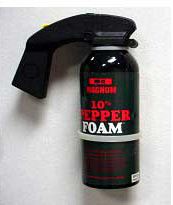|
Chemical agents have always been at the lowest end of every agency’s force options chart. It is also the gift that keeps on giving, even after inmates receive treatment after its application. It is not uncommon for an inmate acting out in a cell to receive a dose of chemicals in hope that his behavior will be modified. This might force him to comply so that no other force needs to be used against him. Several minutes is often permitted to elapse after the first application of a chemical while the inmate’s behavior is assessed. In he is given the opportunity to comply and for response teams to assemble. Inmates are also well aware that staff will attempt to use chemical agents against them and put together makeshift masks out of bedding and clothing in an effort to protect themselves. This may make a direct spray to the face impractical. Area treatment of chemicals in a cell is a common practice as is trying to walk the spray up to the face by first applying it to another part of the body. Also, if the agent is a blended OC/CS agent, the application on exposed and sweating skin away from the face will be even more painful.
If an inmate is mentally disturbed, chemicals may have no effect on him whatsoever. Some officers and deputies may initially believe that this is because an insufficient dose was first applied, so they add more. In this case it is stated that the inmate was naked. Naked inmates who act out are usually mentally disturbed. There is a point where it will become clear that chemicals are not accomplishing the mission intended for them, however. At this point perhaps ten or fifteen minutes may have elapsed.
Cell extraction policies and staffing levels vary from facility to facility. The willingness of supervisors to put their staff into harm’s way is another factor. Both of these factors may delay the removal of an inmate for a longer period of time. It may take over an hour before an inmate who has been sprayed with chemicals, is determined to be disturbed and is acting out to finally be removed from his cell. The only thing that would necessitate a swifter entry would be if the inmate was harming himself or others or was clearly in the midst of a medical emergency. Even in this case personnel would need to be properly equipped in order not to jeopardize their safety.
|
After the inmate’s removal from a cell, he is taken to a medical facility or clinic as was done in this case. At that point it becomes a medical issue and not a custodial one. People react differently to chemical agents. Some recover faster than others. Some might have an allergic reaction to an agent of chemical. This may have happened here. At which point it is again a medical problem and one that appeared to be addressed by custodial staff here.
As was stated in the article, this matter is under investigation. Since this inmate was serving time in a state prison the force standard that will be considered is the 8th amendment. Also under consideration will be deliberate indifference to provide him with medical care. Was the force used in this incident cruel and unusual punishment and did the staff act with deliberate indifference? It doesn’t sound like it. It appears that this inmate does not like the prison he is housed in and wants out and he sees this incident as his ticket to a different location. It will be interesting to learn the final outcome of the investigation.
Read the news story
By Ames Alexander
The Charlotte Observer, N.C.
Originally published on Feb. 9, 2009
CHARLOTTE, N.C. — State prison officials are investigating the claims of an inmate who says prison guards repeatedly doused him with pepper spray — once while he was naked — after he requested medical help.
Afterward, inmate Bill Rayburn alleges, the guards didn’t let him wash off the burning chemicals immediately or get prompt treatment for his injuries, as state policy requires.
Informed by the Observer about the inmate’s complaints, the N.C. Department of Correction said it would investigate the Jan. 13 incident in Anson County and determine whether prison employees should be disciplined.
According to correction officers, Rayburn “was being disruptive and not following orders, and they used pepper spray to get him to comply,” department spokesman Keith Acree said.
He said the accounts offered by Rayburn and the correction officers differ. “So we want to learn what the real story is,” Acree said. " ... The truth probably lies somewhere in between.”
Pepper spray, which contains a chemical found in hot peppers, causes intense pain but usually doesn’t result in lasting injuries. Prison guards use it to control unruly inmates. Imprisoned at Lanesboro Correctional Institution in Polkton, 45 miles southeast of Charlotte, Rayburn is serving time as a habitual felon following convictions for burglary, perjury and other charges.
Rayburn’s sister, Georgia resident Wonda Coppin, has filed complaints with the American Civil Liberties Union and N.C. Prisoner Legal Services, a group of lawyers who represent prisoners.
Rayburn, an Atlanta native, gave the following account in a letter to his sister:
While imprisoned, Rayburn provided confidential information on a fellow inmate who had made a weapon and was threatening to attack a guard. The other inmate found out and repeatedly threatened him, causing Rayburn to suffer chest pains and panic attacks. Early on the morning of Jan. 13, he repeatedly pounded on his cell door to get medical help.
The second time guards responded, Rayburn wrote, they doused him with pepper spray “until the liquid was pouring off of me in streams and landed on the floor in a large pool.” The guards also soaked his bed with pepper spray, he said. Then, he said, they sprayed him in the face.
Rayburn said he screamed in pain, and was taken to the shower to wash off. Guards ordered him to return to his cell, but he refused, saying he wouldn’t be able to stand the pepper spray’s noxious fumes.
Then, Rayburn wrote, the female guard who had first sprayed him did so again, “raking it up and down my naked body as I sat on the floor of the shower.”
“The spray can ran out and she asked for another one and began spraying me again ... my genitals were on fire because she had sprayed me there ... She was laughing when she left me there ... burning from head to toe,” he wrote.
It was almost an hour, he said, before guards let him wash off the spray that morning. He made repeated requests to get medical attention for skin burns on his genitals, he said, but wasn’t allowed to see a nurse until 4:30 p.m. The nurse, he said, examined him quickly but said she saw nothing wrong.
That night, Rayburn said, he asked guards to examine his injuries, and “they all agreed it looked bad.” He requested medical help, but wasn’t seen by a doctor until two days later. The doctor, he said, did not examine him closely and did little to help him. Under Department of Correction policy, guards may use pepper spray to deter “violent, threatening or aggressive” inmates or to defend against an assault. The substance is supposed to be sprayed “directly into the eyes” and inmates are to be given “an immediate opportunity” to flush their eyes with water.
Inmates are also to receive medical treatment immediately if they complain of injury, the policy states.
Department policy also requires prison officials to videotape all incidents when they anticipate the use of force. In his letter, Rayburn said he spoke with a staff sergeant who told him he had seen a videotape of the incident.
But Acree, the Department of Correction spokesman, said prison officials have indicated no videotape was made. There’s also a “great dispute over how much pepper spray was used and where it was sprayed,” Acree said.
“Our officers contend they followed policy and delivered short half-second bursts of pepper spray,” he said.
Coppin, the inmate’s brother, sees the incident in a different light. “Instead of protecting him, (the guards) actually were the ones who attacked him,” she said.
A superintendent and an assistant superintendent from other state prisons will investigate the incident, Acree said. He declined to identify them.
More than once a week, N.C. Prison Legal Services receives complaints from inmates alleging inappropriate use of pepper spray by prison guards, according to Phil Griffin, who heads the group’s civil team.
In Polkton, Rayburn is seeking a transfer away from the 950-inmate high-security prison. Coppin said the incident has left her brother terrified.
“He’s very scared to be around the prisoners. He’s very scared to be around the guards,” Coppin said. “I’m concerned for his life in there.”
Staff researchers Maria David and Marion Paynter contributed.
Copyright 2009 The Charlotte Observer













